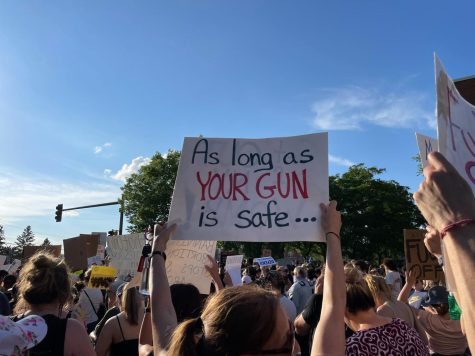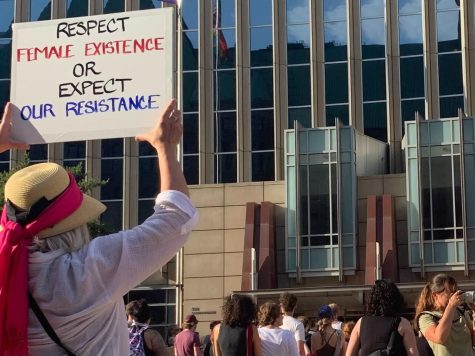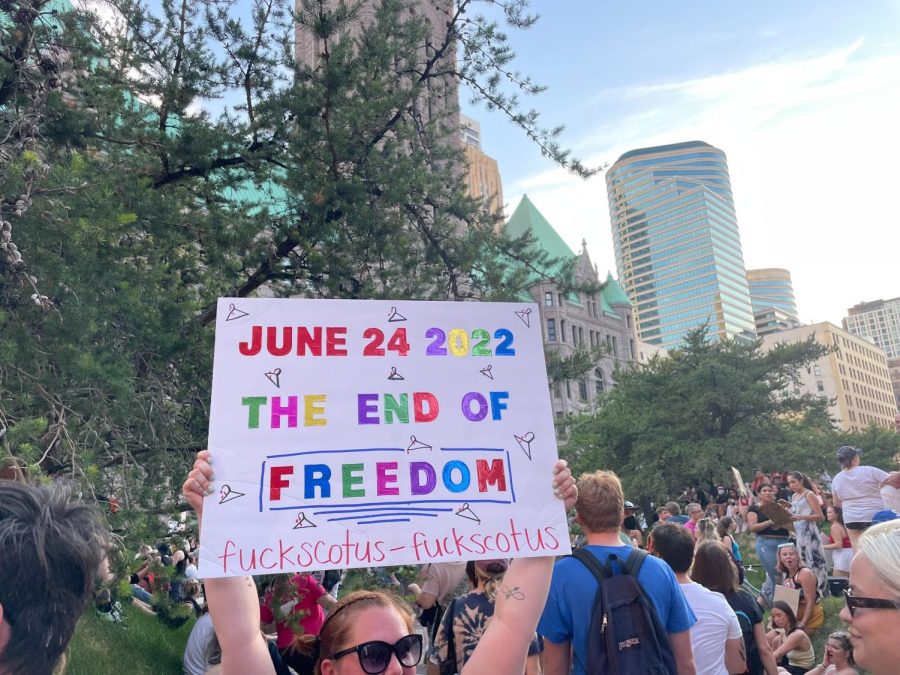A group of 10,000 protesters of various backgrounds took to the streets of Minneapolis Friday evening, condemning the Supreme Court’s decision to overturn Roe v. Wade and strip constitutional protection from women’s right to receive an abortion in a 6-3 majority ruling.
Minnesota is set to become a safe haven for those seeking abortions in the Midwest. All four states surrounding Minnesota — North Dakota, South Dakota, Wisconsin and Iowa — have banned or could restrict abortions. Out of the five states, Minnesota is the only one where abortion is constitutionally protected, due to a 1995 court case.

The protest and march, organized by the University of Minnesota student group Students for a Democratic Society, began outside of the Humphrey School of Public Affairs. After hearing speeches from community activists, protesters marched through the West Bank campus to the Diana E. Murphy U.S. Courthouse in downtown Minneapolis, where other protesters held a vigil organized by UnRestrict Minnesota.
Most protesters said they were angry and upset but glad to be at a place where people from all backgrounds came together to voice their emotions.
“I’m feeling really pissed off,” University student Wulan Macdonald said.
Diane Sauers was among the elderly in attendance and marched in her wheelchair. She said she was not among the protesters who advocated for abortion rights prior to 1973 but that something was different this time.
“This is a terrible decision for this country,” Sauers said, arms wrapped around a sign that read ‘Keep abortions legal.’ “This isn’t the last thing – they are going to take away all our rights.”
Many families attended the protest as well.
“I’m really quite devastated to imagine the rights that I have enjoyed all of my reproductive years — my own daughter will no longer have them,” said Laura Clay, who attended the protest with her children, Amaya Colby-Clay, 14, and Max Colby-Clay, 12, and husband David Colby.
Meredith Aby Keirstead, a spokesperson for the Anti-War Committee and a social studies teacher at Bloomington Public Schools, gave the evening’s first speech. Keirsted said in 1972, her mother witnessed a woman being carried down from their apartment building in Georgia, bleeding to death after attempting to perform an illegal abortion.
“This decision has been law the entirety of my life,” Kirstead said. “We are talking about a generation of people who have had the understanding that we have the right to control our own bodies and they think they can roll that back.”
Many drivers whose journeys had been halted by the march to the courthouse got out of their cars to wave at protesters, some even handing out plastic water bottles.
A vigil at the courthouse
“We will not, we will not, we will not be controlled. We are sovereign in our bodies, we are sovereign in our souls.”
These are the lyrics hundreds of people sang as they gathered in front of the courthouse in downtown Minneapolis Friday. The protesters were gathered for a vigil to protest the Court’s decision.
UnRestrict Minnesota, a campaign working to protect access to abortion healthcare in Minnesota, organized the vigil along with Planned Parenthood, ACLU of Minnesota, Family Tree Clinic, First Unitarian Society and the National Jewish Council of Women.
One of the event’s speakers, Rev. Kelli Clement, called the protest a “grieving space” for the loss of federal abortion rights.
“Even as we knew this was coming, it feels like a death … it is deeply personal,” Clement said. “To the young people here, we’re sorry. We’re sorry that we couldn’t protect it better for you.”
Speakers led protesters in a variety of exercises to help process emotions from the Court’s decision. The crowd lowered their heads in a moment of silence, followed by a collective scream as cars honking in support passed by.
Rev. Jia Starr Brown said the emotions were reflective of activists’ work in the past and will fuel activists’ work in the future.
“This morning when I woke up and read the news, like many of you, I wept,” Starr Brown said. “Every generation hopes that the next will have more than they did … to all who fought and ran successful campaigns for women’s reproductive rights over the decades, we thank you for your work. It matters. It still matters.”
Protesters attending the vigil were there for a variety of different reasons, from rallying for change to showing support.
“I mainly wanted to come to show respect for women,” said Abby Eickhoff. “I don’t feel that you should have restrictions on your body at all.”
For other protesters, it was more personal.
“I’m here because I’m somebody who would access an abortion if I ended up pregnant, I’m non-binary and never want to have children, also I have $10 in my bank account right now,” Victoria Larson said. “I’m here to fight.”

Many in the crowd also shared concerns about the implications of Roe v. Wade’s overturn on other major decisions. In his concurring opinion, Justice Clarence Thomas wrote that the Court should “reconsider” similar cases that guaranteed rights to same-sex marriage and contraception.
Melody Mae and Quinn Iversen said they rescheduled their wedding to August out of fear that LGBTQIA+ rights would be limited in the near future.
“When the Thomas opinion came out today, it pretty clearly said out loud that that’s what he thinks [the Court] should go after,” Mae said. “It’s terrifying.”




















CapnRusty
Jun 27, 2022 at 2:00 pm
The Dobbs opinion returns the abortion issue as a question to be decided by the individual states. That means there will be a discussion among the people. Previously, that has been known as “democracy.”